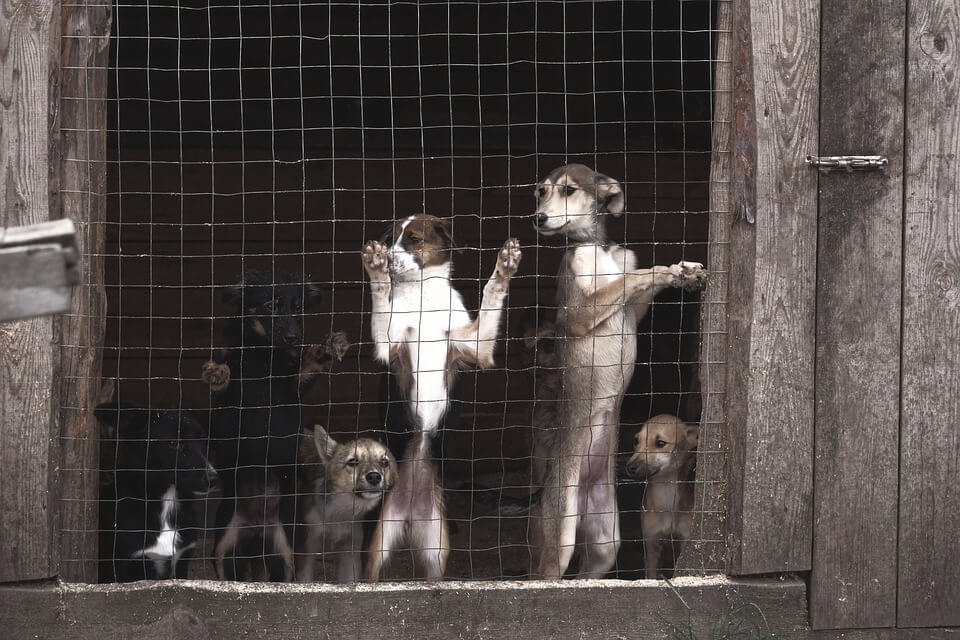This One's for the Dogs!

How Dogs Suffer
Numerous pharmaceutical companies subject dogs to frightening and painful procedures in the development and testing of companion animal–care products, such as flea and tick sprays and spot treatments. A nine-month PETA eyewitness investigation of a laboratory in which such experiments were conducted revealed that dogs had untreated illnesses and injuries, including burns. They suffered from bloody feces, worm infestations, oozing sores, abscessed teeth, hematomas, and pus- and blood-filled infected wounds without receiving adequate veterinary care. Employees viciously cursed at, kicked, and dragged them.
Greyhounds used for racing are caged for 22 to 23 hours a day, given performance-enhancing drugs—including cocaine—and forced to run to the point that many sustain broken legs, develop heatstroke, or suffer heart attacks. They have incurred spinal injuries, broken necks, and crushed skulls, and some have been electrocuted when they’ve collided with electric fences. After they’re “retired” from racing, many are sent to seedy “blood banks”—facilities like California’s now-shuttered Hemopet, that warehouse dogs in crates and barren kennels, subject them to repeated blood draws, and deny them proper exercise, companionship, and even needed medical care.
Dogs used in the annual Iditarod dog-sled race are forced to run about 1,000 miles—roughly the distance from Orlando, Florida, to New York City—in under two weeks. On average, they must run 100 miles a day, with only a few brief periods of rest. They’re subjected to biting winds, blinding snowstorms, and subzero temperatures. Even wearing booties, their feet often become bruised, bloodied, and worn out because of the vast distances that they cover. Many incur pulled muscles and stress fractures or suffer from bleeding stomach ulcers, diarrhea, dehydration, or intestinal viruses, and up to half the dogs who start the race don’t finish. The deadly event has killed more than 150 dogs since it began in 1973, including a four-year-old pregnant dog who collapsed and died during the 2025 race and three young dogs who collapsed and died during the 2024 race.

A deeply disturbing PETA Asia eyewitness investigation revealed that dogs were bludgeoned and killed so that their skin and fur could be turned into cat toys and trim on jacket collars as well as leather gloves, belts, and other accessories. Most of the world’s leather comes from China, where there are no penalties for abusing animals killed for their skins. Workers were filmed grabbing one dog after another around the neck with metal pinchers and bashing them over the head with a wooden pole. Some dogs fell unconscious, while others cried out and writhed in agony. Some still struggled to breathe after their throats were cut and before their skin was torn off. Products made from dog leather are intentionally mislabeled and exported around the world to be sold to unsuspecting customers. So if you buy leather, remember that there’s no easy way to tell whose skin you’re really in.
If you wouldn’t wear the dead body parts of your dog, there’s no excuse for wearing those of any other animal. Below, you can pledge to avoid fabrics that may be derived from dogs.
On any given day in the United States, there are an estimated 70 million homeless dogs and cats struggling to survive. Homeless dogs and cats on the streets get hit by cars, are vulnerable to attacks by other animals and cruel people, and contract, spread, suffer and die from contagious diseases. Of the millions of animals who enter shelters each year, about half must be euthanized for humane reasons or because no suitable homes exist for them. The single most important thing that we can do to save dogs from the suffering and death caused by their overpopulation is to spay and neuter them.
Spaying and neutering are routine, affordable surgeries that can prevent thousands of animals from being born, only to suffer and struggle to survive on the street, be abused by cruel or neglectful humans, or be euthanized in animal shelters. Remember: When you buy an animal from a pet store or breeder, you’re responsible for the death of an animal in a shelter who needed a home. If you want to bring an animal into your life, always adopt—don’t shop.
Chaining dogs, or “tethering” as it’s sometimes called, is a national public- and animal-welfare crisis. One study found that chained dogs were 2.8 times more likely to attack than those who weren’t tethered. Dozens of Americans are attacked every year by chained dogs, with most victims being children. Continuous chaining is also detrimental to the physical well-being of dogs. What’s more, many who are chained are deprived of adequate food and water, shelter, and veterinary care, and their social needs are ignored. They frequently die of heatstroke in the summer or exposure to the cold in the winter. They’re often choke to death by their tethers or are attacked by other animals or cruel people. Find out how you can take action the next time that you see a dog chained outdoors.

Take Rapid Action for Dogs
If you’re ready to start taking action to help dogs, you’ve come to the perfect place. Using the form below, you can quickly complete several urgent PETA action alerts and be transformed into a “doggone” hero with the click of a button.
There are multiple opportunities to take action. As soon as you complete one action alert or pledge below, another will appear in its place. After you enter your personal information, just keep clicking until you’ve completed all of them. Once you’ve taken every action, be sure to share this page with your friends, family members, and social media followers. Encourage them to join you—and tens of thousands of other compassionate people—in making the world a kinder place for dogs.
